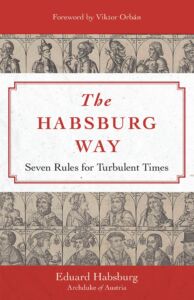Get to Know Your Friendly Neighborhood Habsburg

Eduard Karl Joseph Michael Marcus Antonius Koloman Volkhold Maria Habsburg-Lothringen (photo from his Twitter/X account).
1,652 words
Eduard Habsburg
The Habsburg Way: Seven Rules for Turbulent Times
Manchester, N. H.: Sophia Institute Press, 2023
Unless you’re one of those people who reads the gossipy autobiographies of the British royal family, chances are it’s not often that you hold in your hands a book written by actual nobility. Thanks to Eduard Habsburg, Archduke of Austria and Ambassador of Hungary to the Holy See, that privilege can be yours! Last year, His Imperial and Royal Highness — Wikipedia informs me that this is the appropriate way to address a Habsburg Archduke — wrote The Habsburg Way: Seven Rules for Turbulent Times.
It’s a pleasant little read. Right from the introduction, the Archduke displays a confident forthrightness, love and admiration towards his forebears, and an almost paternalistic demeanor. He makes it very clear that he is proud to be a Habsburg and that his book is not going to indulge the modern reader with lazy and tired criticisms of his family — a family that we’re supposed to deem out-of-place in today’s world, a useless relic from a bygone era. No, for Eduard Habsburg his lineage is not just a list of vaguely familiar names. His ancestors are not merely long-chinned men clad in armor, forever frozen in time on painted canvas. His family is a living, breathing thing that exists today in his beating heart and the hearts of his children and relatives. And he has a thing or two to say about the current state of Western civilization.
Them’s The Rules
There are plenty of books which attempt to impart wisdom and instruction by laying down a set of rules. Jordan Peterson gave the world his 12 Rules for Life in 2018. In 1998, Robert Greene revealed that there were no more and no fewer than The 48 Laws of Power. That same year John Maxwell wrote his 21 Irrefutable Laws of Leadership. Eduard Habsburg’s list of rules is considerably shorter. I won’t spoil all of them for you, but there are a few which are worth mentioning.

You can buy Anthony M. Ludovici’s Confessions of an Anti-Feminist here.
The very first rule is “Get Married and Have Lots of Children.” In this chapter, the Archduke shares with us the remarkable love story of Emperor Maximilian and Mary of Burgundy. When the two were 18 and 19 years old respectively, their parents arranged for them to wed. We often think that young people placed into an arranged marriage were unhappy and dreaded the day of their nuptials, but Maximilian and Mary seemed to fall in love immediately, even if at first they only knew each other through the exchange of yearningful letters.
Then Mary’s father, Charles the Duke of Burgundy, was killed in battle, and this left Mary alone and vulnerable to the machinations of King Louis XI. He mustered his army and marched on Burgundy, intending to make the territory his and make Mary a wife for his own son. Mary sent a letter to Maximilian pleading for him to save her from this fate. Charismatic young Max would raise a small army, but one which grew bigger and bigger as supporters joined him on his way to Ghent, where his betrothed was waiting desperately. Maximilian arrived just in time, wearing a golden suit of armor, and he and Mary got married before the French could do anything about it.
Eduard Habsburg uses this truly chivalric tale as a springboard to impart lessons on the importance of love, marriage, and procreation. He shares anecdotes about the relationship between Maximilian and Mary which makes them more relatable to us moderns. It’s a very strong opening for the book.
Another worthy rule is “Stand for Law and Justice.” Here, the Archduke makes the case that aristocratic families such as his were not out-of-touch bourgeois hedonists, and are not useless relics now. They were effective rulers in their time and we can learn valuable lessons from them. I think Mr. Habsburg gets a lot of things right in this chapter. He points out how so much of modern culture is a hollow fantasy centered on fighting injustice and inequality, and this is in large part due to the global influence of the American foundational myth and so many Hollywood films in which there is an evil empire or tyrant king. Because of this, he writes:
It may take effort for my American readers to accommodate their thinking to the idea that the very purpose of monarchies was to stand for law, justice, and peace for your people. Monarchs may not always have achieved this goal . . . but, nevertheless, it was the goal.
He goes on to say:
[Americans] haven’t seen, or considered, how future monarchs were raised; how they took their first responsibilities and finally took over from their parents; how they then raised children of their own. All they imagine is an oppressive tyrant, sitting on a faraway throne. But the populations in countries with active monarchs, who witness royalty directly or are raised to consider the history of royalty throughout the generations, benefit from a completely different perspective, and this creates a close social bond.
The Archduke argues that the royal families of Europe were raised first and foremost to serve and to fulfill the duties of their station. Throughout this chapter, he cites examples of how the Habsburgs had to get to know the nooks and crannies of their domain and the people they ruled, and understand in great depth the threats to them, as well as how they were trained to learn several languages and taught the examples of their forebears. While admitting that he may have a rose-tinted view, he says that he has firsthand experience of seeing these rigorous standards still being applied to the members of Europe’s royal families today.
To reinforce the point about the bond between monarch and subject, Habsburg tells of an encounter between Joseph II and a traveler stranded on the road. Joseph offered the traveler a place in his carriage, and the traveler, not knowing with whom he was now riding, began telling jokes and sharing stories with the Emperor, at one point even slapping the Emperor’s leg amidst cackles of laughter. When the traveler finally realized who he was speaking to, he was horrified by his vulgar behavior, but Joseph merely laughed and said, “I knew who I was, you didn’t. Nothing has changed. Let’s roll on!”
 Earlier this month I wrote a review of another piece of pro-monarchy material from 2023, the French film Vaincre ou Mourir. As in my review, Habsburg implores us to consider what life would be like in a society governed by responsible individuals trained from birth on the art and craft of leadership. He recounts numerous examples of Habsburg rulers acting as intermediaries between disgruntled factions and as a check against all manner of the degeneracies that can afflict a nation. Even into the early twentieth century, when Habsburg rule was no longer as important as it once was, the Emperor Franz Joseph still maintained that the purpose of his office was “to protect my peoples from their politicians.” Habsburg ends this chapter by asking a question similar to the one I posed in my review of Vaincre ou Mourir: Despite all the flaws that one might accuse monarchy of having, who protects us from politicians today?
Earlier this month I wrote a review of another piece of pro-monarchy material from 2023, the French film Vaincre ou Mourir. As in my review, Habsburg implores us to consider what life would be like in a society governed by responsible individuals trained from birth on the art and craft of leadership. He recounts numerous examples of Habsburg rulers acting as intermediaries between disgruntled factions and as a check against all manner of the degeneracies that can afflict a nation. Even into the early twentieth century, when Habsburg rule was no longer as important as it once was, the Emperor Franz Joseph still maintained that the purpose of his office was “to protect my peoples from their politicians.” Habsburg ends this chapter by asking a question similar to the one I posed in my review of Vaincre ou Mourir: Despite all the flaws that one might accuse monarchy of having, who protects us from politicians today?
The book’s other rules are mostly focused on the importance of being Catholic. Obviously, this is a matter close to home for the Hungarian Ambassador to the Holy See and descendant of a long line of Catholics. If you’re into that sort of thing, you’ll enjoy those chapters. I found them the least interesting, and also betraying the inherent Catholic tendency towards universalism and, ultimately, the liberalism to which Eduard Habsburg thinks he and his family represent an opposition.
This universalist tendency is also on display in a chapter which I did find very interesting, the one entitled “Believe in the Empire and in Subsidiarity.” This rule is perhaps the most politically-centered. I found it compelling and enjoyable because of the Archduke’s not-so-subtle winks and nods telling the reader, “Look, I’m unironically saying that monarchy is based and you’d love it.”
He puts forth trenchant criticisms of the European Union and the current trend of centralizing policy and lawmaking to higher and higher levels of power which are farther and farther away from the people who will live under these policies and laws. At the same time, he also sings from a rather liberal hymn sheet when he praises the Habsburg realm for essentially being a multicultural state done right. Still, I can forgive him for this. While being a hopeless romantic pining for the days of aristocracy and empire, he is also trying to be a realist and a pragmatist. The world is ever more connected and, in the case of Europe particularly, many nations do live under one flag: the blue and star-spangled banner of the EU.
The lesson to be learned from the Habsburg way of doing things is found in the concept of subsidiarity. We might not restore the monarchies or the Holy Roman Empire, but we might be able to restore some of their values and ideas regarding proper governance. At the very least, the bureaucrats in Brussels could learn to respect the lower levels of government (nation-states, regions, provinces, and townships) and understand the importance of empowering them. None of this seems likely to happen without the current ruling class being made to learn this lesson the hard way.
Eduard Habsburg’s book couldn’t have come out at a better time. He has noticed and seized upon the growing discontent of people all across the liberal democracies of the West. It’s hard to read The Habsburg Way and not come away with a sense of admiration for this famous family and a hint of longing for a ruling class more like them. So, mission accomplished, Your Imperial and Royal Highness.


